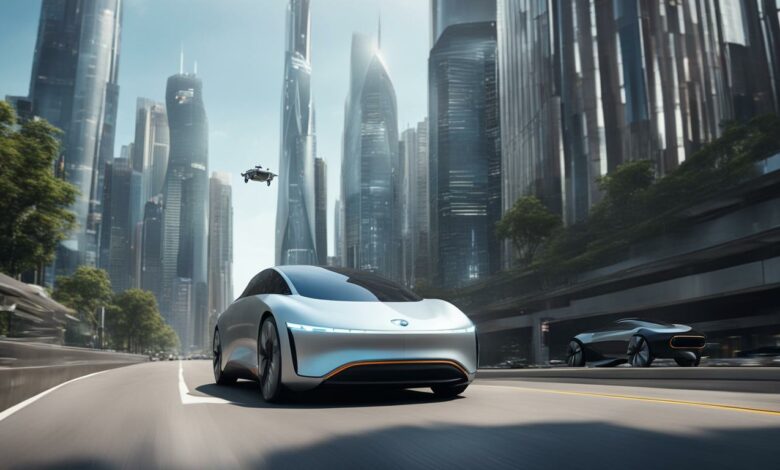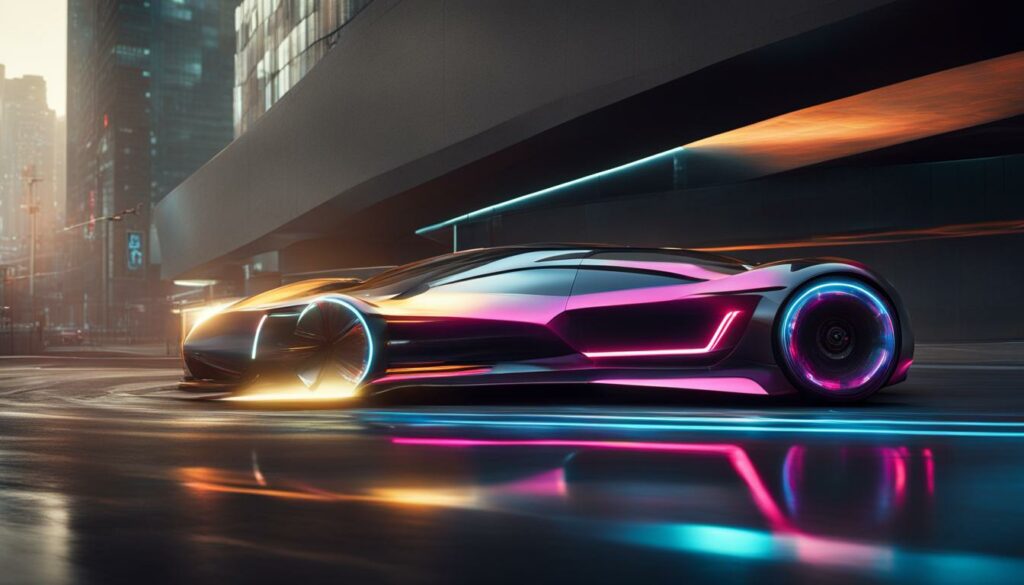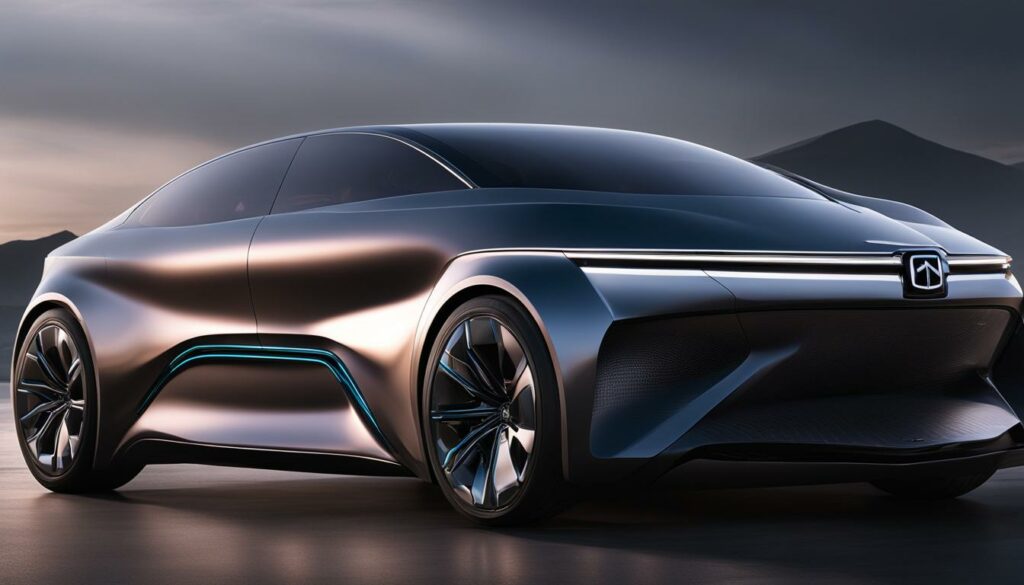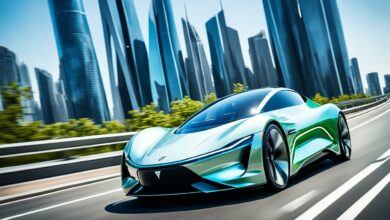Auto Innovation Trends Transforming Transportation

The world of transportation is rapidly evolving with new auto innovations and advancements in automotive technology. From electric and autonomous vehicles to cutting-edge safety features and sleek vehicle designs, the automotive industry is constantly pushing the boundaries of what is possible. In this article, we will explore the latest auto technology trends and innovations that are transforming transportation.
Key Takeaways:
- The automotive industry is constantly pushing the boundaries of innovation with new advancements in technology.
- Innovations in auto engineering, vehicle design, and sustainability are transforming the way we think about transportation.
- Emerging trends such as electric and autonomous vehicles, smart cities, and mobility solutions are shaping the future of the auto industry.
- With eco-friendly technologies and initiatives, the automotive industry is moving towards a more sustainable and environmentally-friendly future.
- The possibilities for auto innovation are endless and the future of transportation is looking brighter than ever.
The Evolution of Auto Engineering
The automotive industry has come a long way since the invention of the automobile. Over the years, auto engineering has evolved significantly, resulting in groundbreaking innovations that have transformed how we drive. From technological advancements to safety features, the latest trends in auto engineering have paved the way for a more efficient, sustainable, and safer transportation system.
One of the most significant advancements in auto engineering is the rise of electric vehicles (EVs). With the demand for sustainable transportation solutions on the rise, car manufacturers are starting to invest more heavily in electric powertrains. Today, there are various EV models available on the market, from luxury sedans to affordable hatchbacks. As a result, the electric vehicle market is expected to reach $800 billion by 2027.
Another trend in auto engineering is the development of autonomous driving technology. With the potential to increase road safety and reduce accidents, autonomous vehicles are becoming more prevalent. In fact, most car manufacturers have invested heavily in autonomous driving technology, and companies like Tesla have already started offering self-driving features in several models.
Advanced safety features are also a significant trend in auto engineering today. From blind-spot detection to lane departure warnings, these safety features have improved the overall safety of vehicles. As a result, we have seen a decline in accidents and fatalities on the road, making driving a safer experience for all.
Top 5 Electric Vehicles by Range
| Vehicle Model | Range |
|---|---|
| Tesla Model S Plaid | 390 miles |
| Ford Mustang Mach-E GT | 270 miles |
| Audi e-Tron | 222 miles |
| Volkswagen ID.4 | 250 miles |
| Hyundai Kona Electric | 258 miles |
The evolution of auto engineering has led to groundbreaking innovations in the automotive industry. With electric vehicles, autonomous driving, and advanced safety features becoming more prevalent, we can expect a more efficient, sustainable, and safer transportation system in the future. As the industry continues to evolve, we can look forward to even more exciting advancements in auto engineering.
Revolutionary Car Technology
The automotive industry is undergoing a transformation with the introduction of revolutionary car technology that has the potential to reshape the way we drive. Among these is the electrification of powertrains, which is paving the way to a cleaner, more sustainable future. Hybrid and electric vehicles are not only better for the environment, but they also offer a thrilling driving experience.
Connected cars are also a part of the revolution, giving drivers more control and making the driving experience safer. These cars have integrated systems that communicate with each other and the outside world using real-time data to provide vital information such as traffic updates and weather conditions. Additionally, advanced infotainment systems are providing drivers with more personalized and convenient features, such as voice-activated controls and wireless phone integration.

Image description – The image depicts an electric car on a road surrounded by trees.
Cutting-Edge Vehicle Advancements
The automobile industry is constantly evolving, with cutting-edge vehicle advancements pushing the boundaries of innovation. Today’s vehicles are built with breakthrough technology, focusing on areas like fuel efficiency, lightweight materials, and aerodynamics.
Engineers and designers are continually exploring new ways to make cars more eco-friendly while maintaining high-performance standards. Hybrid and electric vehicles are becoming increasingly popular, with some models offering impressive mileage and smooth driving experiences. Revolutionary battery technology is making electric vehicles more accessible and affordable, with faster charging times and longer ranges.
But it’s not just the engines that are changing. Lightweight materials and aerodynamics are helping cars become more energy-efficient, while still providing safety and comfort features that drivers expect. Innovative designs are enabling more significant reductions in drag, leading to better performance and energy efficiency.
The use of carbon fiber materials, once limited to high-end sports cars, is now becoming more widespread, helping vehicles shed weight and increase efficiency. Buoyed by automobile industry breakthroughs, new safety features are being introduced and refined, such as forward-collision warning systems and automatic emergency braking, reducing the number of accidents on the road.
There’s no doubt that cutting-edge vehicle advancements are changing the way we drive. The rise of electric and hybrid cars, the use of lightweight materials and aerodynamics, and the development of groundbreaking safety features are all contributing to the transformation of the automobile industry. We can expect more leading-edge technological advancements and automotive industry breakthroughs that will continue shaping and improving the driving experience.
Innovative Vehicle Designs
The automotive industry is constantly pushing the boundaries of innovative vehicle designs, incorporating advanced materials and technologies to enhance both aesthetics and functionality. Sleek and aerodynamic exteriors are the new norm, with many manufacturers opting for futuristic designs that reflect the cutting-edge technologies underneath the hood.
The interiors of modern vehicles are also undergoing a revolution, with customizable features becoming increasingly popular among consumers. From fully adjustable driver seats to built-in infotainment systems, these features are designed to offer a personalized driving experience.
One of the most exciting trends in innovative vehicle designs is the incorporation of eco-friendly materials. Many manufacturers are using sustainable materials such as recycled fabrics, renewable woods and plastics, and even vegan leather, to create interiors that are both stylish and eco-friendly.

As consumers become increasingly conscious of their environmental impact, we can expect to see a continued emphasis on innovative designs that prioritize sustainability and eco-friendliness.
The Future of Auto Technology
The automotive industry is constantly evolving, and the future of auto technology is looking brighter than ever. With advancements in the latest auto technology, we can expect to see significant changes in the way we drive and interact with our vehicles.
Electric vehicles, for instance, are becoming increasingly popular, with major car manufacturers such as Tesla, GM, and Ford investing heavily in electric powertrains. This shift towards electric and hybrid vehicles is not only more environmentally friendly, but it also provides a smoother and quieter driving experience.
Autonomous driving is another exciting advancement on the horizon. With the ability to self-drive, it could offer greater safety, more efficient roadways, and more free time for passengers.
| Emerging Trends in Auto Technology: | Benefits: |
|---|---|
| Electric/Hybrid Powertrains | More sustainable and energy-efficient driving experience |
| Autonomous Driving | Increased safety and efficiency |
| Smart Cities | Reduced traffic and optimized driving experiences |
Smart cities is yet another emerging trend in the automotive industry that will revolutionize the way we drive and interact with our environment. Smart cities will feature technologies such as advanced traffic management systems, interconnected vehicles, and remote diagnostics capabilities. These features will enable safer, more efficient, and more sustainable transportation options.
The future of auto technology is bright, with plenty of exciting advancements on the horizon that will transform the way we drive, interact with our vehicles, and move around our cities.
Advancements in Sustainability
With auto innovation at the forefront, the automotive industry is making significant strides in sustainability by integrating eco-friendly technologies and initiatives.
One example of these initiatives is the development and production of electric vehicles by companies like Tesla and BMW. As well as hydrogen-powered vehicles, such as the Toyota Mirai, Honda Clarity, and the recently launched Hyundai Nexo.
The industry is also focused on the implementation of recycling and waste reduction practices, which play a critical role in reducing carbon footprint and preserving the environment for future generations. For instance, several companies, such as General Motors and Ford, are using recycled materials like plastic bottles and denim to create vehicle parts that are just as functional as those made from traditional materials.
Overall, these sustainability efforts are paving the way towards a greener and more responsible automotive industry.
The Advantages of Eco-Friendly Driving
Cars powered by eco-friendly technologies like electric batteries or hydrogen fuel cells have significant benefits for the environment and for drivers. They emit fewer pollutants, like greenhouse gases, which can directly impact air quality and contribute to climate change. Additionally, these vehicles are typically more quiet, smooth, and efficient than traditional gas-powered cars, providing a comfortable and enjoyable driving experience.
“The auto industry has the ability and responsibility to develop and implement solutions that will mitigate the environmental impact of transportation and promote a sustainable future for all.”
Conclusion
Auto innovation has taken the automotive industry to new heights, transforming transportation as we know it. From advancements in electric vehicles and autonomous driving to cutting-edge vehicle designs and sustainability initiatives, the possibilities are endless. As technology continues to evolve, the automotive industry will undoubtedly see even more innovations, further cementing its role in shaping the future of transportation. By staying ahead of the curve and embracing new ideas and trends, the industry will continue to thrive and create exciting opportunities for drivers around the world.
As we look towards the future, it is clear that auto innovation will remain at the forefront of the automotive industry. From emerging trends to breakthrough innovations, there is always something new on the horizon. By embracing the latest auto technology and continuing to push the boundaries of what’s possible, the industry will continue to transform and innovate for years to come. So, let’s keep our eyes on the road ahead and stay ahead of the curve when it comes to auto innovation and automotive industry innovations!
Unveiling Volvo: Which Country Does This Car Brand Belong To?
FAQ
What is auto innovation?
Auto innovation refers to the advancements and developments in technology and engineering that are revolutionizing the automotive industry. It encompasses cutting-edge technologies, innovative solutions, and revolutionary vehicle designs that are transforming transportation.
What are some examples of automotive industry innovations?
Some examples of automotive industry innovations include electric vehicles, autonomous driving, advanced safety features, hybrid and electric powertrains, connected cars, advanced infotainment systems, fuel efficiency advancements, lightweight materials, aerodynamics, and innovative vehicle designs.
Why is auto innovation important?
Auto innovation plays a crucial role in shaping the future of transportation. It enhances the driving experience, improves fuel efficiency, ensures better safety, reduces harmful emissions, and allows for more sustainable and eco-friendly solutions. Auto innovation also opens up new possibilities and creates exciting opportunities for the automotive industry and society as a whole.
What can we expect in the future of auto technology?
The future of auto technology holds immense potential. We can expect further advancements in electric and autonomous vehicles, the integration of smart city technologies, the development of advanced mobility solutions, and the continuous evolution of vehicle connectivity and artificial intelligence. The future will bring even more innovative and sustainable solutions to the automotive industry.
How are innovative vehicle designs changing the automotive landscape?
Innovative vehicle designs are redefining aesthetics and functionality in the automotive industry. They encompass sleek and aerodynamic exteriors, futuristic and technology-rich interiors, and customizable features that enhance the driving experience. These designs not only make vehicles more visually appealing but also improve performance, comfort, and user-friendliness.




